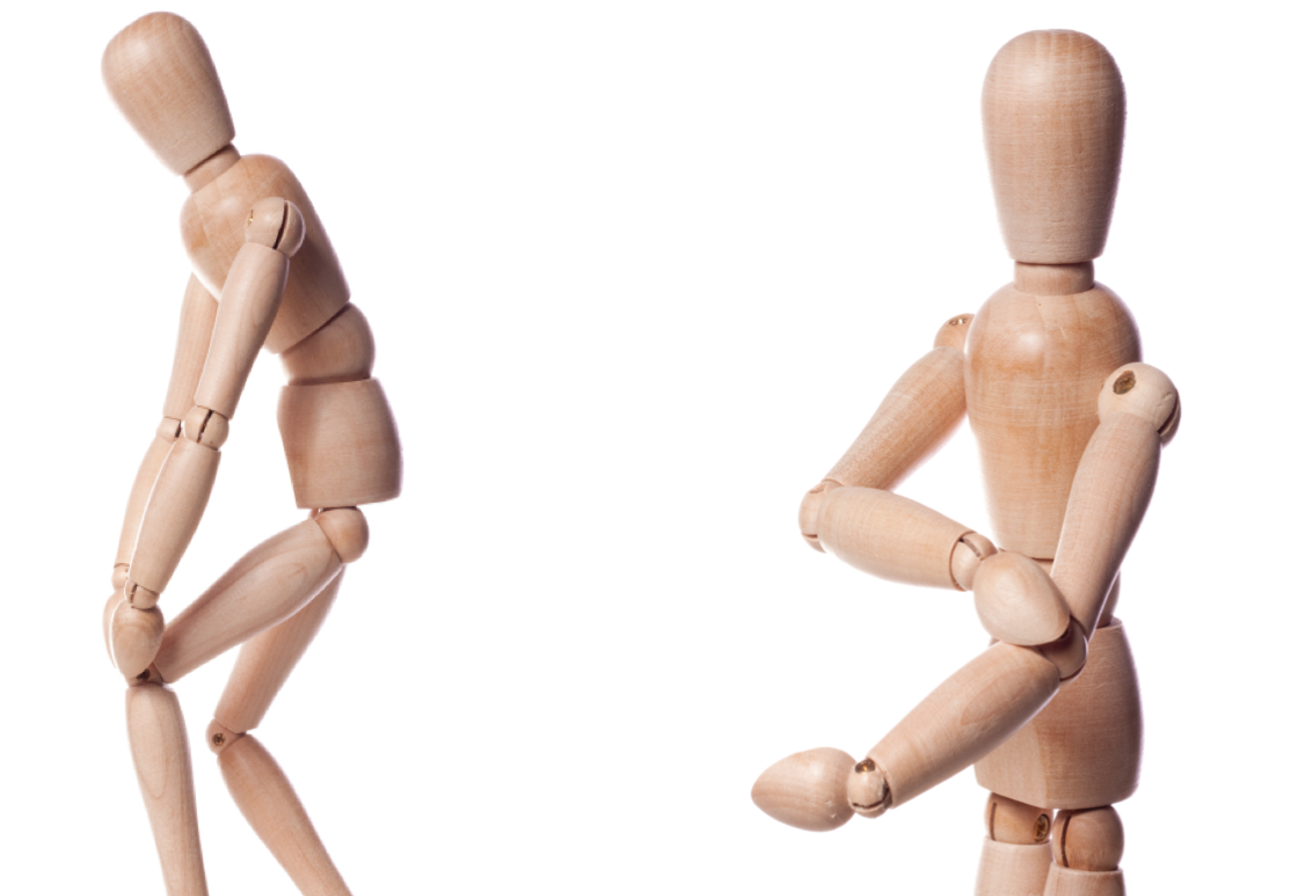Avoiding heart disease and looking ‘fab’ aren’t always great reasons to lose weight. However, here are 5 immediate and significant ways your life can change when you trim the fat.
- Want to listen instead of read? Download the audio recording here…
++++
I’d like you to join me in a thought experiment.
I promise there’s a point to it. In fact, we’ll soon talk about why most popular reasons for losing weight are either uninspiring or scientifically worthless.
But, for now, let’s begin by setting our feelings, insecurities, assumptions, stories, and beliefs about body fat aside.
You might feel confused. Or defensive. Or saying “Yes, but…”
Please bear with me. Just for a few minutes.
Forget, for a moment, about looking good.
Forget about “thin privilege”. Forget about “fat privilege”.
Forget about personal rights or civic obligations.
Forget about abs and guns and lats and whatever other laundry list of nonsense is now used to describe various body parts.
While you’re at it, forget about whatever other wretchedness the Internet has spawned this week. (Thigh gap? Duck lips? Bikini bridge? Manscaping?)
So, yeah, forget about body image.
Forget, for a moment, about disease.
Forget about all the big-name medical scares including atherosclerosis, arterial plaque, cardiac arrest, pulmonary hypertension, stroke, all the cancers, diabetes, and metabolic syndrome.
And forget about what some randomly chosen biomarker says.
“My glucose tolerance is good. I’m healthy and fat!”
“My triglycerides are low. I’m healthy and thin!”
“My cholesterol is excellent. I’m healthy and jacked!”
For a moment, let all of that go. (More on why in a second).
And, most of all, forget about “health at any size”.
Yes, obese people do have the right to be treated with dignity.
Absolutely and certainly.
And, yes, obese people should be supported in efforts to become more healthy outside of weight loss. As we all know, health isn’t a direct function of your weight.
However, the “health at any size” movement goes one step too far in suggesting that obesity is harmless. That it’s not bad for you. That having excess body fat is of no more consequence than wearing a red sweater or driving a Nissan Sentra.
This is simply not true; it contradicts most of the available evidence.
So, for now, forget a) looking good, b) disease, and c) “health at any size”.
Each of these obscures the real, significant reasons people should consider losing weight.
For example: The mainstream conversation about fatness and health focuses on medical conditions that can kill or disable us. While these make for great headlines, this angle isn’t very compelling.
Why not? Well, imagine that bacon (or broccoli, or some other food) causes a 10 percent increase in some horrible cancer-type disease. Scary, right?
Not when you realize that your chance of dying from that horrible cancer-type thing without bacon (or broccoli) is only 1 in 100,000 (or 0.001 percent). And that a 10 percent increase from eating bacon (or broccoli) means your chance rises to 1.1 in 100,000 (or 0.0011 percent).
Meh.
Since we’re all going to die anyway, medical scare tactics simply don’t come off as scary (especially when you know what the data really mean). Nor do they motivate change.
The fitness industry, of course, takes another approach.
In fitness it’s all about looking great in a certain type of clothing, or on the beach, or at your high school reunion. And while that can seem inspiring for a minute, it’s not proven to be a sustainable way to achieve long-term weight loss and maintenance.
5 GOOD reasons for losing weight.
In the end, the most popular incentives — scary disease statistics and fitness industry vanity trips — aren’t very effective, useful, or scientifically valid ways to promote weight loss.
That’s a huge missed opportunity, because there are much better reasons to lose weight. More pressing, more evidence-based, more quality-of-life focused reasons.
Sadly, they’re not often talked about in the public debate.
(Notice that I said public debate. Scientists and doctors talk about them all the time. They’re well established in research. They just haven’t made it to the public yet).
So let’s talk about them now.
Reason #5: Your knees and elbows will thank you.
Osteoarthritis is a degenerative joint disease, in which we lose cartilage and gradually destroy the bones of our joints.
Imagine two rocks grinding together and you get the idea of how fun that is.
In my experience, healthy people don’t think much about osteoarthritis because it’s common. Aging makes it more likely. Everyone’s grandma has a twinge of arthritis.
So we think it’s normal.
This hides the degree to which it can be very unpleasant and debilitating.
Like most chronic illnesses, osteoarthritis is a vicious cycle.
- Your joints hurt, so you move less.
- Moving less means your joints don’t get loaded.
- Less joint loading means muscle weakness.
- Muscle weakness means force doesn’t get cushioned correctly.
- Less cushion means the condition worsens.
- More osteoarthritis means more pain.
- And, onwards, we circle the drain.
The point? Obesity makes it much more likely that you’ll get osteoarthritis.
In one study comparing the heaviest patients to the lightest, the chance of being diagnosed with osteoarthritis in one knee was more than 6 times in the heavy group. For both knees it was almost 18 times.
(Naturally, other studies over the last 20 years have investigated the same relationship. Some estimates are higher, some are lower. But the association between body fat and osteoarthritis has been replicated several times.)
The reason this happens is complicated.
It isn’t just that heavier people put more weight on their joints, and those joints then degrade over time. It’s also that there seems to be a relationship between the presence of excess fat tissue and inflammation.
Thus, osteoarthritis probably comes from a combination of excess joint loading plus the inflammatory chemical and hormonal environment that having too much body fat creates.
Bottom line: One important reason to lose weight is to reduce joint pain and improve your movement. These are things you can benefit from almost immediately.

Reason #4: You’ll get a good night’s sleep.
Think of what happens when a rockslide blocks a tunnel.
That’s sleep apnea: The upper airway collapses while you sleep, cutting off that oxygen tunnel.
Just so you know, sleep apnea is more than a little snoring.
Sleep apnea means you stop breathing. Over and over and over. As you sleep.
Which is bad.
More body fat means more potential for sleep apnea. This comes from a few combined factors:
- Fat in your airway narrows the space available. This makes your airway more prone to collapsing.
- Fat in your upper body puts weight on your lungs and reduces the space available to them. You need more oxygen but you can’t get it as well.
- Fat — a hormone-producing organ — changes your hormonal signals. This rewires your respiratory systems.
While around 25 percent of adults have sleep apnea, 50 percent of obese adults have it.
Even more scary: If you have mild sleep apnea, and you put on weight, the chances of you graduating to moderate or severe sleep apnea are:
- 5 percent weight gain = 250 percent increase of severe sleep apnea
- 10 percent weight gain = 650 percent increase of severe sleep apnea
- 20 percent weight gain = 3,700 percent increase of severe sleep apnea
(And it’s scariest for children: 46 percent of obese children have sleep apnea, while the typical incidence in children is approximately 3 percent).
So, why is sleep apnea bad?
Sleep is a major regulator of our metabolism. If our sleep is bad, so is our metabolic health.
This means things like elevated inflammation, rapid cell aging and oxidation, and hormonal disruption (and, yes, higher risk for all kinds of nasty chronic diseases in the long term).
Bottom line: Another important reason to lose weight is so that you can sleep better. Not only does this help regulate metabolism, hormone systems, and more. It helps you feel, think and live better right away.
Reason #3: You’ll actually start to taste your food.
This may sound weird, but it seems that people who struggle with their weight don’t taste food as well.
Wait, what? People who often eat more food can’t taste as well? Exactly.
Why? We’re not sure. We don’t yet know whether excess body fat changes your tastes. Or whether your tastes change your appetite and cause weight gain.
We also don’t know whether this is an issue of:
- “wanting” tastes: seeking and craving the reward of tastes
- “liking” tastes: actually enjoying tastes
- chemical signaling: how taste is created in the mouth and interpreted by the brain
Here’s what we do know.
People vary in how well and sensitively they can perceive different flavors and textures such as fattiness or sweetness.
One hypothesis is that if we can’t taste as well, we eat more food to compensate.
On the flip side, people with high BMIs seem to avoid bitter foods more, and have a stronger “disgust” response. As it happens, many vegetables are bitter or astringent (think of kale, Brussels sprouts, green peppers, etc.).
So there seems to be a relationship between:
- excess body fat;
- wanting and liking fat / sweet foods and pleasant tastes;
- eating fat / sweet foods; and
- avoiding unpleasant tastes.
How might this happen?
Animal models are handy here since we can control their food intake and they don’t seem to care much about food advertising.
So, in animal models:
- Overfeeding obesity-prone mice changes how their taste cells function.
- Rats with obesity-related changes in fat/sugar reward can at least somewhat reverse those changes with weight loss.
- Rats given weight loss surgery (yes, that’s a real thing) appear to go back to their “normal” liking/wanting behavior.
Put simply, what this could mean is:
- Many people with excess body fat also have altered flavor perception.
- The flavor perception could pre-date gaining fat.
- Or, the flavor perception could be caused by gaining fat. Or both.
The only observation I’ll add is that the foods we consider to be the most responsible for obesity just happen to pander directly to this dysfunction by having aggressively over-sweet, over-salty, over-fatty, etc. flavor profiles.
We eat and eat and eat them, but they never seem to satisfy. It’s a Sisyphean irony.
The good news is that in both humans and rats, tastes are changeable.
This means that losing fat, getting fit, and consistently building healthy habits can actually change how we perceive flavors. In a good way.
(One day, you might just find you like Brussels sprouts after all).
More importantly, when you truly enjoy food, you eat less, but you feel much more satisfied.
Bottom line: Obese people have altered taste perceptions leading to eating more and eating more of the wrong foods. By losing weight you’ll end up craving less high-sugar and high-fat food. You might even enjoy an extra veggie or two.
Reason #2: Your immune system will work properly again.
We tend to think of body fat like an ATM: a place where we deposit or withdraw energy. It isn’t.
Instead, fat is an active endocrine organ. That means it secretes hormones and cytokines (cell signaling molecules).
Hormones and cytokines have effects throughout the body. They “talk” to one another chemically.
Like all things, balance is important. If we have a healthy amount of fat, our hormones and cell signals work properly. If we have too much, things go wrong.
For example, with too much body fat our immune systems get off kilter.
There’s a huge, scary pile of evidence here so let’s keep it simple.
Increased BMI and more body fat is associated with greater risk for several kinds of infections including:
- gum infections,
- nose and sinus infections,
- stomach infections, and
- herpes (thankfully, the mouth kind).
Why? Too much adipose (fat) tissue can release large amounts of immune chemicals. Over time, this chronic high exposure can interfere with the body’s ability to spot and stop actual outside infections.
Bottom line: Losing body fat can mean a healthier, more responsive, more robust immune system. And that means fewer colds, fewer infections, and a healthier daily life.

Reason #1: You’ll survive surgery and childbirth.
People with a lot of body fat:
- are harder to intubate,
- have a higher risk of incisional hernia post-laprascopy
(i.e. popping open again), - have a longer operation time,
- have a higher risk of catheter site infection, and
- have a higher rate of serious postoperative complications.
Surgery is a risky business for people who are obese.
This is a double whammy because people who struggle with obesity also struggle with more health issues that may require surgery.
So obese people may need surgery… but not be able to get it, or not recover as well when they do.
Pregnancy is a good example of this.
- Among women who are significantly obese, about 50 percent of them must undergo Caesarean sections, compared to only about 20 percent of the general population.
- Even if they give birth vaginally, obese women may have to have a lot more instruments and medical procedures involved.
- After surgery, mothers with obesity may end up with more surgical site infections.
This is aside from other pregnancy complications, which also go up significantly as body fat increases.
Bottom line: Every surgery patient wants a safe and speedy recovery. And every mother wants a safe birth and a thriving, bouncing baby. Having a healthy range of body fat makes those happy outcomes much more likely.
What to do next:
Some tips from Precision Nutrition
Let’s forget about all the “shoulds”, as in, “You should lose weight because blah blah terrible thing will happen.”
Let’s focus on how awesome life can get when your body is as functional, mobile, and metabolically healthy as it can possibly be.
1. Go toward the good
We’ve noticed a trend in the stories of people who lost a great deal of weight:
They focus on the small blessings and achievements of everyday life.
- “I can live in a walk-up apartment now.”
- “I can run around with my kids.”
- “I don’t get tired through the day.”
- “Food tastes better. I can’t explain how.”
- “My random aches and pains stopped.”
- “I can carry my two-year old without wheezing.”
- “I have so much more energy.”
- “I bounce back from illness straightaway now.”
And they always sound so satisfied.
2. Seek incremental change
“Thigh gap” and “healthy at any size” are the two extremes of one problem: an all-or-nothing approach to health and body weight.
Real, lasting changes in diet and lifestyle require a different approach.
Precision Nutrition Coaching clients who achieve the most success come to realize that incremental change serves them best — and, to their surprise, produces immediate improvements in quality of life.
3. Focus on the tangible benefits
Losing weight isn’t magical. Your life is still your life, regardless.
Yet with a healthy amount of body fat, your life often becomes a little bit easier and better. You’re a little more functional and mobile. A little more able.
So if we talk about fat, let’s not tell people (or ourselves) how to feel. Or how to cheat death.
Keep the focus on positive changes you could see in your life in just a few weeks’ time:
- Knees that work.
- Colds that go away.
- A good night’s sleep.
- Food that tastes nice.
- A straightforward recovery after surgery.
References
Click here to view the information sources referenced in this article.
If you’re a coach, or you want to be…
You can help people build sustainable nutrition and lifestyle habits that will significantly improve their physical and mental health—while you make a great living doing what you love. We'll show you how.
If you’d like to learn more, consider the PN Level 1 Nutrition Coaching Certification. (You can enroll now at a big discount.)




Share